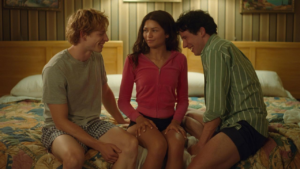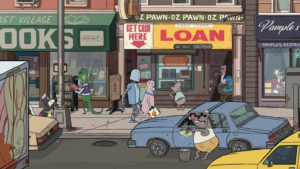Reviewed by GREG KING
Director: Tommy Lee Jones
Stars: Tommy Lee Jones, Hilary Swank, Grace Gummer, Miranda Otto, Sonja Richter, John Lithgow, David Dencik, Jesse Plemons, William Fichtner, Tim Blake Nelson, James Spader, Meryl Streep, Jo Harvey Allen, Barry Corbin, Hailee Steinfeld.
A solemn tale of redemption and second chances The Homesman is not your typical western. With its slow, languid pace, emotional depth and lack of action, this revisionist western subverts the genre tropes of your average John Wayne or Clint Eastwood shoot ’em’ up into something a bit more profound and ambitious. This is a more lyrical, elegiac and character driven western that has a hard and bitter edge and a more feminist slant, yet it is still undeniably steeped in that sense of epic grandeur with which the great John Ford suffused his films.
The Homesman is based on a 1988 novel written by Glendon Swarthout, whose previous works include True Grit (which has been filmed twice, once with John Wayne as the indomitable Rooster Cogburn, and again with Jeff Bridges in the role), The Shootist, which gave Wayne his final screen outing, and the ecologically friendly coming of age drama Bless The Beasts And Children, which was directed by the late Stanley Kramer, a filmmaker known for his social conscience and serious dramas.
The Homesman deals with an epic journey undertaken by independent-minded spinster Mary Bee Cuddy (Hilary Swank), who is charged with the task of driving three spiritually broken and mentally distressed women back to Iowa and safety. The women have been driven to the edge of madness and desperation by the hardships of life in the remote region of Nebraska in the 1850s following a particularly severe winter. Because the town has no facilities to care for the three women the townsfolk decide that the best course of action is to drive them in a special stage coach to Iowa and a hospice run by missionaries.
The three women are Arabella Sours (Meryl Streep’s daughter Grace Gummer), who carries a doll in place of her daughters who died of disease; Gro Svenson (Sonja Richter, from the dark Scandinavian thriller The Keeper Of Lost Causes) has suffered at the hands of her brutal husband (David Dencik) and has been further driven to grief by the death of her mother; and the fragile Theoline Belknapp (Australian Miranda Otto). A series of flashbacks show us their backstories.
Mary Bee enlists the help of the dissolute drifter George Briggs (Tommy Lee Jones), whom she saves from the end of a hangman’s noose to act as a guard through the harsh and inhospitable frontier territory. They embark on a long and treacherous five week journey through an inhospitable and desolate landscape that also takes a heavy emotional toll on Mary Bee and Briggs.
Swank brings both a vulnerability and a strength and almost masculine quality to her performance as the plain, lonely but tough minded Mary Bee, who volunteers to drive the women across the state as a way of finding some meaning to her rather empty life. Nobody does grumpy and gruff like Jones, and he plays to his strengths here as the cynical, roguishly charming and cantankerous Briggs, who slowly warms to Mary Bee’s reserves of true grit, strength and resilience.
Jones has adapted the novel in collaboration with first time feature writer Kieran Fitzgerald, and Wesley Oliver, his personal assistant for several years. This is obviously something of a passion project for Jones, as he has also directed the film. This is Jones’ fourth outing as director, and follows the off beat modern western The Three Burials Of Melquiades Estrada. He again demonstrates a superb eye for composition and the lyrical beauty and atmosphere of the old west. This is an authentic looking wild west, far removed from the usual depiction by Hollywood. But Jones’ deliberately languid pacing may not suit everybody. And the third act is a little problematic, with some uncharacteristic decisions made by one of the characters, and a rather bleak, downbeat conclusion.
But the film looks stunning, thanks to the cinematography of Roberto Prieto, whose widescreen lensing captures the visually beautiful but harsh, flat and inhospitable terrain of Nebraska in the 1850s.
Gummer, Otto and Richter are wasted in mannered performances as the painfully fragile and largely mute women. Jones has obviously called in a lot of favours too, as he has assembled a stellar ensemble supporting cast to flesh out even the smallest roles, including the likes of John Lithgow as a priest, Meryl Streep, James Spader as an unscrupulous land developer, William Fichtner, Hailee Steinfeld, Tim Blake Nelson and Jesse Plemons.
★★★




